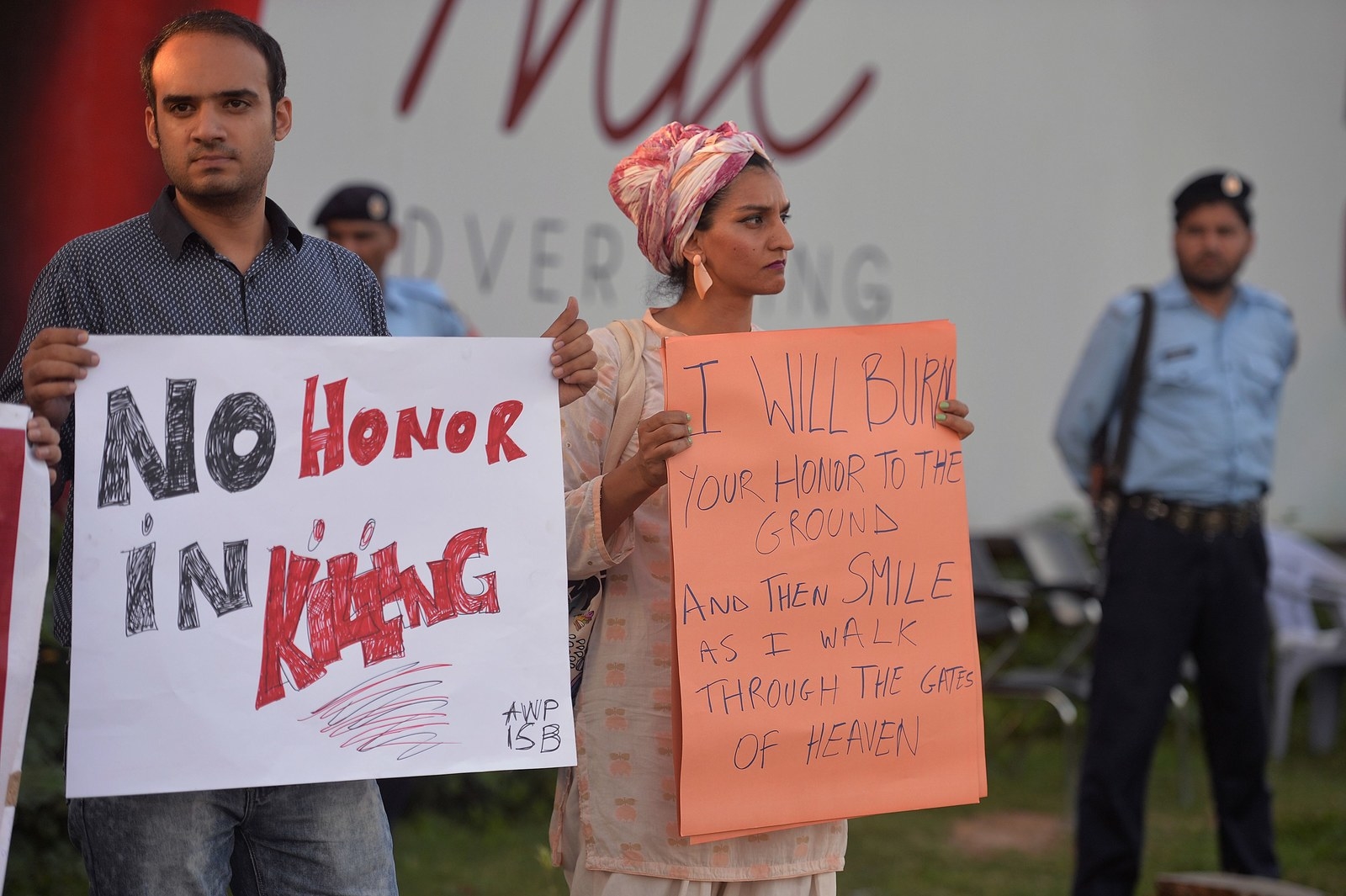
The first time Qandeel Baloch appeared on our Facebook newsfeed, she was casually peering into the camera, adjusting the frame as she dabbed back her hair and asked the man behind the camera, “How am looking?”
She was unapologetically confident, supremely comfortable on screen and had no qualms taking on trolls. As the media tried to make sense of her, she earned label after label: ‘Pakistan’s Kim Kardashian’, ‘A gutsy, feminist provocateur’, ‘a rebel with sexual agency’, ‘a shame to the nation’.
In a world where the Internet has become a smokescreen for people to anonymously spew hate, Qandeel's defiance stood out. She regularly posted videos calling out haters. “If you think you’re that honourable then there’s an unfollow button, please unfollow me,” she would suggest casually, but with an unmistakable undercurrent of aggression.
During the later part of her year-and-a-bit-long spell of online stardom, she took on and indeed, took down misogynist anchors, sports stars and politicians. She was artful, fearless and entertaining in her attempts at attacking the patriarchy.
The western media lazily labelled her the “Kim Kardashian of Pakistan". What they didn't realise was that she had none of Kim’s privilege.
And yet, those of us who followed her knew very little about her personal life. She often appeared on our screens from a bedroom that looked like a hotel room, or a guest room and sometimes she would post videos from scenic places she was visiting.
Even when she appeared on Aik Din Geo Kay Saath, a TV show whose entire premise was giving viewers an intimate look into the lives of their favorite celebrities, Qandeel only showed us the life she had created for herself and was willing to share with the world. We knew nothing about her family, where she grew up or what prompted her to join social media. We only knew what she wanted to share and that seemed enough. When she did speak of her family, it was contained within carefully crafted references to her childhood and growing up with her brothers.
In Pakistan, the class you are born into dictates your identity, the opportunities available to you and your position in society. Qandeel was born Fauzia Azeem, the daughter of a poor farmer in Shah Sadar Din, Punjab. But even as a child, she refused to conform. She built a world of her own; climbing trees, playing cricket with her brothers, watching TV, and studying, instead of doing household chores like her sisters. She even refused to cover her head out of compulsion.
“She was different, not like me,” her elder sister tells us. “When she was young she grew interested in going to school after our brother Aslam joined the army. When he’d come home... he’d bring home his uniforms. Then I’d wash them and hang them up to dry, and she’d get her hands on them and wear them. She’d say, ‘I’m also going to wear clothes like these, I’m going to join the army, get a job, study, move to the city. I’ll make something of myself. I’ll show everyone. One day they’ll recognize Azeem’s daughter, they’ll know my name in all of Shah Sadar Din.’”
She adds further, “My mother wanted the girls to study. No girl in our family went [to school before.] My father’s relatives would admonish him for sending us to school... but our mother would put her foot down and say no, her daughters will go to school. So we went.”
At age 13, Qandeel set out on a public van to see her grandmother in a nearby town. It was too radical an act for her family patriarchs and ended up costing her her education, and eventually, her independence. She was forced into wedlock at the age of 17.
Within a year though, she had fled her abusive husband, losing her infant son in the process. She took refuge in a women’s shelter, worked odd jobs in the city, did small modeling gigs and worked on mainstream TV before emerging onto our timelines as what western media lazily labelled the “Kim Kardashian of Pakistan".

What they didn't realise was that she had none of Kim’s privilege.
Only after her death did we understand that she carefully guarded her personal life as part of a deliberate and clearly thought out strategy that only a working class woman without any class protection and social privilege would think to deploy.
The Americanized Hindi accent she used in her videos was a learned trope she used to protect her class background. Her first language was Saraiki. Urdu and English were skills that she’d acquired by diligently watching TV.
“She would talk to us on the phone in Saraiki and people around her would say who you are talking to? She’d respond it’s my parents, they only speak Seraiki. I talk to them in Seraiki,” her mother explains to us.
“Did you hear her [speak in] English? ... She was so good in English, so clever,” her father adds.
In a society where everyone has to assimilate in order to exist, she was always on the margins. She stood for those weren't represented in Pakistani mainstream media spaces except as stereotypes: the poor, the wife, the domestic worker, the poor wife of a domestic worker.
Her radical and supposedly ‘impious’ stance put her at odds with the patriarchal core of the Pakistani milieu which demands that one bow to masculine power in order to gain acceptance. As a working class woman, she not only defied her class, she also navigated, questioned and ultimately collided head-on with the agents of the capitalist, hetero-patriarchal centre: the state, the clergy, the media, and middle class morality. Qandeel's defiance meant that she would never gain acceptance. But she did manage to attract an audience, agitated it to its very core.
Qandeel made headlines when she took on the head of the moral brigade and the guardian of our collective piety, Mufti Abdul Qawi. As her selfies with Qawi turned into a media sensation, she spoke out about the hypocrisy of Qawi, who flirted with her on national television and allegedly requested to meet her in private.
Fauzia broke down on live television, begged for help, and told us all that we’d get her killed. It didn't matter.
Then came the attacks that would eventually take her life. The media reduced her to a sexualised caricature and made her a spectacle for the consumption of the middle class. They hounded her with personal questions, attempted to berate and shame her and when all else failed they started digging up details of the personal life that she had worked so hard to conceal.
As details of her upbringing and class background were leaked, she became disposable and suddenly everything was fair game. It was during the witch-hunt that the mask began to slip and for the first time, we saw Fauzia Azeem, a young woman who had the courage to walk out of a violent relationship, a young mother who had been forced to give up her child and a fighter who had built a career that defied the trajectory set by her birth.
Fauzia broke down on live television, begged for help, and told us all that we’d get her killed.
It didn't matter.
She might even have defied death as Azeem, her father, explains, had it not been the cowardice of her brother who sedated her before killing her. The same brother she had fed, clothed and supported throughout her life.
“Waseem did not have the courage to kill her. He gave her drugs and then killed her. [He] could not have killed my daughter [otherwise], she was my tigress,” her father says.
Fauzia Azeem was found dead in a home she'd been keeping up for her elderly parents. She was found dead at the hands of the brother who was allegedly egged on by her older brother whom she would train with whenever he returned from military duty. She was found dead in the midst of a witch-hunt perpetuated by vultures who could never understand her defiance. The same vultures who would abuse and threaten her over Facebook day and night, yet flock to her whenever she appeared at a public place.

After her death, the only narrative we heard in mainstream media was about her "honour killing." Honour killing is an orientalist term. By calling her murder an honour killing we take her agency away and essentialise her murder from this Western lens.
On the occasion of the anniversary of her death, we need to pay heed to the words used to remember her. We must celebrate the story of a survivor of forced marriage, of domestic violence, of undefined motherhood; the story of a girl who hailed from a poor family and climbed the socio-economic ladder by controlling her own narrative.
On the occasion of the anniversary of her death, we must call out our media and intelligentsia who whitewashed a working class Pakistani narrative for the white gaze. They do not represent.
On the occasion of the anniversary of her death, we must call out non-intersectional white feminists and their brown counterparts at home who obsess over Qandeel's identity, reducing her to a victimised Muslim woman that serves the oldest imperialist purpose: “To let white man save the brown woman from the brown man.” They do not represent.
Qandeel opened up a space for women, for the marginalised, for the low-income, for the queers, for the illegitimates of this society. But the struggle continues. People with these identities still live in constant fear of the threat, not only from their patriarchal families, but also from the state: the cybercrime law has ushered in a new era of control in which their expression is criminalised, their opinions penalised, their struggles outlawed and their voices treated as a national security concern.
On the day of her first barsi, remember the oppressive agents of the centre Qandeel resisted against till her last breath and that they worked in cahoots to silence her.
As Qandeel’s sister puts it: “Whatever happened to my sister, first it was Mufti Qawi, and then it was the media who caused my sister’s death.”
Follow Qandeel Ki Kahani, a Facebook page that is telling Qandeel’s story through the eyes of the people closest to her.


